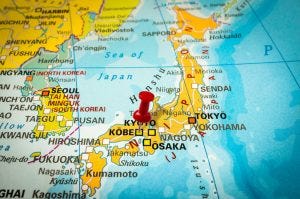
Novartis has tripled production capacity for its commercial CAR-T therapy Kymriah over the past year and continues to ramp up through a deal with Japan’s Foundation for Biomedical Research and Innovation (FBRI).
Kobe, Japan-based FBRI has received marketing authorization from Japan’s Ministry of Health, Labor and Welfare (MHLW) to manufacture Kymriah (tisagenlecleucel) for Swiss pharma giant Novartis.
The approval expands the manufacturing footprint of the chimeric antigen receptor (CAR) T-cell therapy, bringing Novartis its first Asian production facility. Furthermore, according to Novartis, this is the first CAR-T cell therapy commercial manufacturing site in Asia.

Image: iStock/andriano_cz
“The addition of FBRI to our manufacturing network will help to offer additional manufacturing capacity for patients in Japan. We are making important progress to increase manufacturing capacity and optimize the entire Kymriah experience for patients in need,” Novartis spokeswoman Anja von Treskow told Bioprocess Insider.
Kymriah became the first commercial CAR-T, approved by the US FDA in August 2017. Since then, Novartis has ramped up its manufacturing network to supply the product, which is approved for two indications: acute lymphoblastic leukemia (ALL), and diffuse large B-cell lymphoma (DLBCL).
“Commercial manufacturing of Kymriah is now ongoing at Novartis-owned facilities in Stein, Switzerland, Les Ulis, France and Morris Plains, New Jersey, USA, as well as at the contract manufacturing sites at Fraunhofer-Institut for cell therapy and immunology (Fraunhofer-Institut für Zelltherapie und Immunologie) facility in Leipzig, Germany, and now FBRI in Kobe, Japan,” said von Treskow.
“We have tripled manufacturing capacity over the past year, with additional plans for expansion. We recently received FDA approval for another capacity increase at our manufacturing facility in Morris Plains, NJ in March. “
The firm also has a stake in Chinese drugmaker Cellular Biomedicine Group (CBMG), which will manufacture CAR-T cell therapy Kymriah for the China market.
“Novartis has the largest geographical network in the world including seven CAR-T manufacturing facilities, across four continents with commercial manufacturing ongoing in five countries globally. This comprehensive, integrated footprint strengthens the flexibility, resilience and sustainability of the manufacturing and supply chain,” we were told.
“Our strategy includes the collaboration with established manufacturing organizations, like FBRI, which allows us to further progress our mission to deliver Kymriah to every patient in need in a timely way.”
While sales of Kymriah have fluctuated since launch, Novartis’s recent financials shows revenues are now on an upward trajectory. In Q3 2020, it pulled in $122 million for Novartis, up 51% year-on-year. The firm said: “Coverage continues to expand, with more than 260 qualified treatment centers and 26 countries having coverage for at least one indication.”
About the Author
You May Also Like

schedl_b_and_w.jpg?width=100&auto=webp&quality=80&disable=upscale)
schedl_b_and_w.jpg?width=400&auto=webp&quality=80&disable=upscale)






